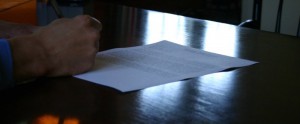—Stephen Batchelder
Writing Better Cover Letters
Over the course of this year I have dished out a considerable number of resume reviews and I hope that the feedback has proven constructive and beneficial. In comparison to how many questions I have fielded regarding resumes, I have been asked significantly fewer questions about cover letters. This has puzzled me as a young peer career advisor. If the resume is really the only thing that matters, then why are cover letters important? For this blog I would like to turn my attention to the first article that most all employers will see, the Cover Letter.
The truth is that the cover letter is often an overlooked marketing tool. In a competitive job market a strong cover letter can significantly improve your status as an applicant. The cover letter laid out in our Job/ Internship/ Gradate School Search Guide is very good for helping us Wabash Men get the gist of the basic cover letter format, but my aim is to help point out some finer details that will help you write a “Better Cover Letter.”
The first piece of advice; you need to research the company you are applying to. It is not enough to have a generic cover letter that you simply change the address on. An employer will often see hundreds of cover letters that are not tailored specifically to the company that you are applying to. Especially if you have a connection to someone within the company or you demonstrate a good knowledge and interest in the company, you can prove that you are interested in the position and your resume more often than not will receive more careful consideration. However, it is important not to simply demonstrate your acquaintance with an employee with the company, but state something like “I learned about this position through a recent conversation with John Doe.” Depending on the size of the company you are applying to it may be necessary to state your contact’s connection/ position with the company.
Secondly, in your body paragraph you are making an argument for why you should be hired. So it is important to include concrete evidence. It is much more interesting to read about your involvement in a local juggling club and how that has given you the ability to respond quickly to adversity, they to simply say “I have am able to learn quickly and have the ability to overcome adversity.” It is also important to remember that your selling points should be tailored to the position the cover letter is addressing. If the position advertises that they are looking for candidates with “strong interpersonal communication skills,” you will want to show how you have demonstrated strong interpersonal communication skills. This could be a skill developed from a leadership position in you fraternity or on an immersion trip to work with disadvantaged families in Peru. Where ever you have you have demonstrated these qualities, you should discuss those in depth rather than just writing, “I have strong interpersonal communication skills.” Be Concrete.
My final piece of advice is to remember that the focus of the cover letter is to convince the reader to look at your resume. With this in mind your cover letter says a lot about your resume. If your cover letter is generic and you are unable to highlight specifics of your resume that make you an ideal candidate for the position, then why would an employer feel inclined to look at your resume? On the other hand if you write an outstanding cover letter, but neglect to include that information on your resume, that is equally as problematic. It will seem contradictory to an employer to see an experience described in your cover letter absent from your resume. This tells the employer that perhaps you felt the experience not significant enough to include on your resume and therefore the wonderful argument you made in your cover letter is disregarded. To use your resume and cover letter to your best possible advantage the experience or experiences discussed in your cover letter should reflect what will be seen on your resume. Yet, it is important to remember that the resume and cover letter are not meant to be repetitive. Rather, the cover letter provides a coherent, argumentative account linking and developing the experiences presented on the resume.
In closing I leave five pieces of advice to remember when writing cover letters.
- Take Your Time– Do not wait to write a cover until just days before the application is due. Think carefully about how you can present yourself in the best possible way to an employer through your cover letter.
- Research the Company– Never send a generic cover letter. Tailor your cover letter like your resume for each position you apply for. Always remember to write to your audience and address their concerns, expectations, and requirements.
- Be Specific– Explain a specific experience in depth. Refrain from using phrases like, “I have a wide range of experiences” or “I have made numerous contributions to a variety of organizations.” It is not the diversity of your experiences that will get you an interview, but the diversity of your skills.
- Convince the Reader– You are making an argument for yourself in your cover letter. Why would the employer want to hire you? Just like any paper state a thesis and support it.
- Proof Read. Proof Read. Proof Read.
Here are a few cover letter samples that demonstrate the points I have discussed.
http://www.docstoc.com/docs/41475301/SAMPLE-COVER-LETTER-VIA-EMAIL
http://www.docstoc.com/docs/41475209/SAMPLE-COVER-LETTER-FOR-AN-INTERNSHIP

